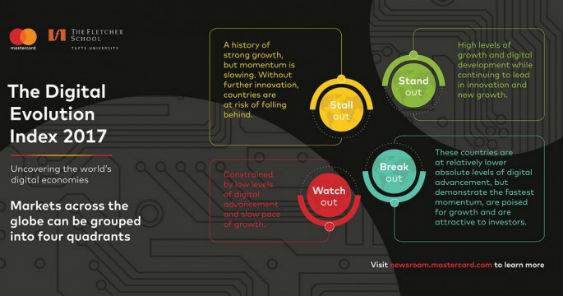PURCHASE and MEDFORD – The Fletcher School at Tufts University in partnership with Mastercard today unveiled the Digital Evolution Index 2017. This comprehensive research tracks the progress countries have made in developing their digital economies and integrating connectivity into the lives of billions.
The research identifies Singapore, the United Kingdom, New Zealand, the United Arab Emirates, Estonia, Hong Kong, Japan, and Israel as digital elites characterized by high levels of digital development and a fast rate of digital evolution. With momentum and innovation on their side, these ‘stand out’ markets exemplify the sweet spot of advancement and future growth.
With nearly half of the world’s population online, the research maps the development of 60 countries, demonstrating their competitiveness and market potential for further digital economic growth. The Index measures four key drivers and 170 unique indicators to chart each country’s respective course:
- Supply (or internet access and infrastructure)
- Consumer demand for digital technologies
- Institutional environment (government policies/laws and resources)
- Innovation (investments into R&D and digital start-ups etc.)
Businesses, governments and civil society are working to bring everyone online, while also ensuring the security of the digital infrastructure. The report provides a way to assess digital “trust” as well as the state and rate of digital evolution with examples from around the world, giving countries the opportunity to learn from each other to further their advancement.
“Adoption, the quality of digital infrastructure and institutions, and innovation collectively shape a country’s digital competitiveness, but governments also play a key role. The report also found that consumers’ trust in digital technologies correlates with digital competitiveness,” said Bhaskar Chakravorti, senior associate dean of international business & finance at The Fletcher School at Tufts University, and founding executive director of Fletcher’s Institute for Business in the Global Context.
The Findings
- According to their overall digital evolution scores, Norway, Sweden, Switzerland, Denmark, Finland, Singapore, South Korea, the United Kingdom, Hong Kong, and the United States make the top ten list of advanced digital economies, but given the current pace of innovation and change, being an advanced digital economy today doesn’t guarantee that status tomorrow. How open and supportive they are to innovation help determine their future growth potential.
- Combining the pace and state of digital advancement, the research puts markets into four distinct categories:
- Stand Out –Singapore, the United Kingdom, New Zealand, the United Arab Emirates, Estonia, Hong Kong, Japan, and Israel demonstrate high levels of digital development while continuing to lead in innovation and new growth.
- Stall Out – Many developed countries such as in Western Europe, the Nordics, Australia and South Korea have a history of strong growth, but their momentum is slowing. Without further innovation, they are at risk of falling behind.
- Break Out – Though still at relatively lower absolute levels of digital advancement, these countries demonstrate the fastest momentum, are poised for growth and are attractive to investors. China, Kenya, Russia, India, Malaysia, Philippines, Indonesia, Brazil, Colombia, Chile and Mexico exhibit this breakout potential.
- Watch Out – Countries such as South Africa, Peru, Egypt, Greece and Pakistan face significant challenges, constrained both by low levels of digital advancement and a slow pace of growth.
“We all know technology can do more to improve economies and make our lives better, but growth is only achievable if everyone has confidence in the developing ecosystem,” said Ajay Bhalla, president, global enterprise risk & security, Mastercard. “In our pursuit of a truly connected world, trust and security are critical to successful digital development.”
New This Year: The Trust Factor
To date digital trust has proved difficult to understand, let alone measure, but it remains a keystone of the global digital economy. New to the 2017 report, the research team at The Fletcher School analyzed 42 of the 60 countries in the Index around four key dimensions — behavior, attitudes, environment, and experience — to understand the state of digital trust. Some of the findings include:
- China, Switzerland, Singapore, and the Nordics score well on different metrics, but for vastly different reasons.
- The Chinese consumer is an outlier when it comes to demonstrating patient user behavior in the face of friction, such as slow internet speeds.
- Western and Northern European states lead in digital trust experience and environment scores, which reflect investments in strong security, privacy, and accountability measures, and in minimizing friction.
- Overall the research shows that in countries where their momentum score was higher, consumers were more tolerant of friction in their daily digital interactions and transactions, suggesting that momentum may be a vital factor in understanding consumer behavior and trust.
Further, governments and businesses are considered the guarantors of trust, and are charged with facilitating trust among their citizens and consumers. The findings demonstrate that trust is critical to digital competitiveness, and that countries can only go so far without it.
Implications: How Countries Can Win
More details and country-specific case studies can be found in the summary insights overview including:
- Use Public Policy as Key to the Success of the Digital Economy: This has implications ranging from Brexit negotiations to how India nudges its society towards a “less cash” future to the U.S.- China competition for economic dominance.
- Identify What Drives Digital Momentum: Developed and developing economies ought to emphasize different ways to spur growth: innovation and institutions, respectively.
- Jumpstart Small Country Growth by Involving Government: They can grow quickly as early adopters by assembling the right ecosystems.
- Reinvent the Digital Stalwarts: The most digitally advanced countries can use their scale and existing connections in the world to reinvent themselves.
- Play Digital Catch-Up by Closing the Mobile Internet Gap: The least digitally advanced countries must prioritize increasing internet access via mobile phones.
- Work Harder to Earn Users’ Trust: As nations become more digitally evolved and momentum slows, technology providers and policymakers may need to prioritize building trust to continue growth.









